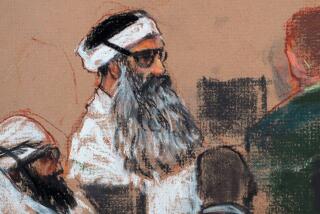Most CIA interrogation cases won’t be pursued
- Share via
Reporting from Washington — The Justice Department has decided not to file criminal charges in the vast majority of cases involving the CIA’s former interrogation, detention and kidnapping program.
In a statement to CIA employees on his last day as director, Leon E. Panetta said Thursday that after an examination of more than 100 instances in which the agency allegedly had contact with terrorism detainees, Assistant U.S. Atty. John Durham decided that further investigation was warranted in just two cases. Each of those cases resulted in a death.
Panetta, who is to be sworn in as Defense secretary Friday, did not disclose specifics about those cases, but it has been widely reported that one involves Manadel Jamadi, who died in 2003 at Abu Ghraib prison in Iraq after he was beaten while being questioned in a shower by a CIA interrogator.
“Both cases were previously reviewed by career federal prosecutors who subsequently declined prosecution,” Panetta said.
Atty. Gen. Eric H. Holder Jr., who announced the CIA investigations in August 2009, followed Panetta’s announcement with a statement that confirmed the decision but did not explain it. Beyond the two detainee deaths, “the department has determined that an expanded criminal investigation of the remaining matters is not warranted,” Holder said.
The announcements mean that no CIA officer will face prosecution in connection with interrogations that the agency’s inspector general and a Justice Department official under former President George W. Bush concluded had exceeded what lawyers had authorized.
For example, a 2004 CIA inspector general’s report concluded that the way the CIA practiced waterboarding, an interrogation technique that simulates drowning, was harsher than Bush administration lawyers had envisioned in the memos they wrote signing off on it. The memos were later criticized as badly reasoned, and many lawyers believe waterboarding was never legal.
Three detainees, including Khalid Shaikh Mohammed, the self-professed mastermind of the Sept. 11 attacks, were waterboarded. Obama administration officials, and an investigation by Senate Democrats, have concluded the techniques yielded no real intelligence value, though former Bush administration officials hotly disagree.
Panetta praised the decision not to file charges in most cases, as did Rep. Mike Rogers (R-Mich.), who chairs the House Intelligence Committee.
Army Gen. David H. Petraeus, who succeeds Panetta as CIA director, told the Senate Intelligence Committee last week that “it is time to take the rear-view mirrors off the bus with respect to certain actions out there.”
Lawyers for the American Civil Liberties Union disagreed.
“We continue to believe that the scope of Mr. Durham’s mandate was far too narrow,” said Hina Shamsi, director of the ACLU’s National Security Project. “The central problem was not with interrogators who disobeyed orders, but with senior officials who authorized a program of torture.”
More to Read
Sign up for Essential California
The most important California stories and recommendations in your inbox every morning.
You may occasionally receive promotional content from the Los Angeles Times.











